高中英语Unit1Schoollife分课时教案牛津译林版必修
牛津译林版高中英语必修一Unit 1《School Life》(Word power)教案

To strengthen tection, we can give the students more practice.
Ask the students to take out the maps they prepared before class. Let them discuss the map and put their maps into English first.
*Walk towards / past…, and then wa lk between…and…. You will find…at the end of the road.
Step 2.Read a map
After the warming up exercises, we will come to the topic of this period.
进行口语练习,在练习中掌握词汇
板书设计
(用案人完成)
当堂作业
完成口语任务和单词识记
课外作业
预习语法,并且完成课后作业
教学札记
Module 1 Unit 1 School life Word power
课题
M1U1 Word power
课型
新授课
教学目标
Enable the students to learn the words and expressions about school facilities.
Help t he students learn how to master the words and expressions about school facilities and equipment in the gym
【英语】牛津译林版高中英语必修一Unit1SchoolLifeword教案
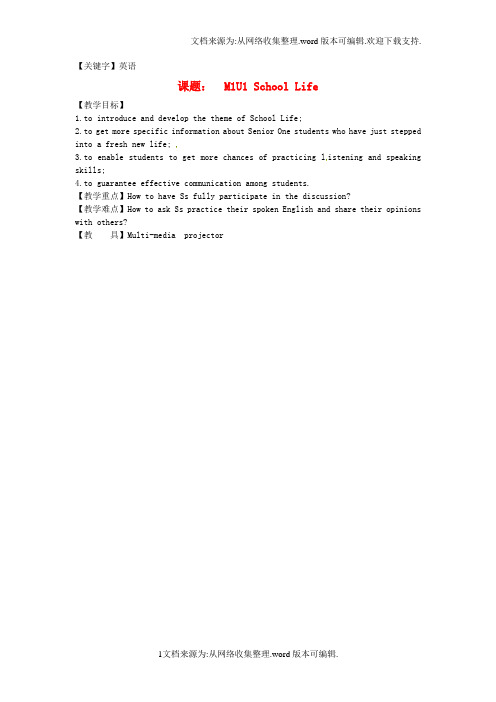
【关键字】英语课题: M1U1 School Life【教学目标】1.to introduce and develop the theme of School Life;2.to get more specific information about Senior One students who have just stepped into a fresh new life;3.to enable students to get more chances of practicing l istening and speaking skills;4.to guarantee effective communication among students.【教学重点】How to have Ss fully participate in the discussion?【教学难点】How to ask Ss practice their spoken English and share their opinions with others?【教具】Multi-media projector【教学过程】【二次备课】Step 1 Greeting and lead-inWelcome to our English class. I’m very glad to see you here.It’s the beginning of a new team you have just finished juniorschool and are about to enter a new period in your studies.In your opinion, what do you think of your school life?School life: excitement, challenges, success, laughter’s,tears, joys, sorrows, dreams, discoveries,failures.Step2welcome to the UnitT: High school is a time of discovery, learning and hard work.You should cherish the time and makeProgress every day. I can see you’re eager to know whatstudying at senior high will be like inChina?Is it different from other countries. Let’s compare them.In the British High SchoolIn the Chinese High School1.huge campus and low-rise buildinglarge campus and tall buidings2.locker for every studentnone has such equipment3. fewer students in each class 40-50-604. at ease with teachersbe friendly to each otherstep3 DiscussionT: Discuss the three questions on page1Can you dream of your school life? ( teacher? Students?Classmates?) what characteristics should theyhave?Teachers: fair, patient, learned, humorous, co-operative,energeticStudents: diligent, e nergetic, civilized, polite,competitive, co-operate, open-minded,strong-mindedT: very good. Teachers and students should cooperate with eachotherTeacher s hould love / learn from/ encourage/ understand/help/ respectT: only in this way. Can we make progress every day and achievesuccess. How can we achieve Success?(courage, belief, luck, diligence, perseverance,intelligence,confidence, competence,cooperation, wisdom, determination)T: like a scientist bent on making a discovery, we must cherishthe hope that one day we will rewarded.Some useful saying1.Life is a bumpy road.2.where there is a will, there is a way.3.Failure is the mother of success.Step4 Language points1.High school is a time of discovery, learning and hard work.抽象名词time, means, knowledge, collection, 在具体语境中,即后面有of短语或后接一个定语从句,前面要加不定冠词a/anThere was on ce a time when I hated to go to school.have a good knowledge of English 精通英语have a large collection of coins2.What are some differences between……?参考金榜直通P2补充:tell the difference between A and B= tell A from B 3.What is your dream school like?What is sth like? 某物是什么样的?What is sb like? 某人的(性格、外貌....)是什么样的?What does sb/ sth look like?某人(某物)看起来是什么样的?How is sth?某物的质量如何?How is sb?某人的身体怎样?补充:你觉得…..怎么样?How do you like/find ……?What do you think of ……?What do you like about ……?发散:like doing/ to do 喜欢做....Would ike to do 愿意做....feel like doing 想做.....Sound like 听起来像......【作业布置】【教学后记】此文档是由网络收集并进行重新排版整理.word可编辑版本!。
牛津译林版必修一Unit 1《School life》word教案
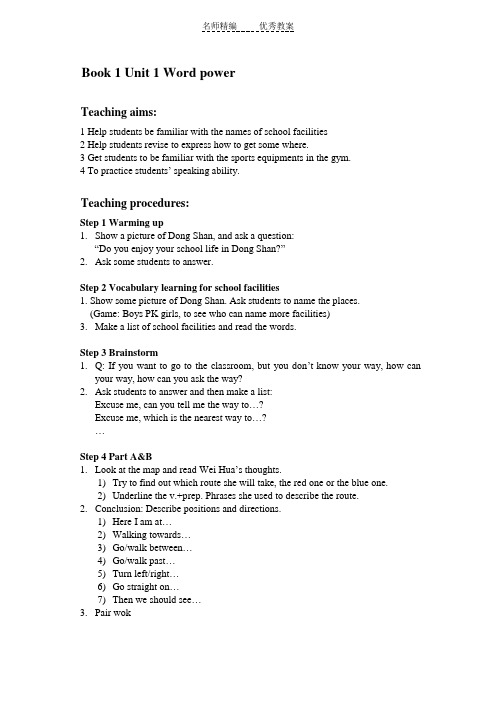
Book 1 Unit 1 Word powerTeaching aims:1 Help students be familiar with the names of school facilities2 Help students revise to express how to get some where.3 Get students to be familiar with the sports equipments in the gym.4 To practice students’ speaking ability.Teaching procedures:Step 1 Warming up1.Show a picture of Dong Shan, and ask a question:“Do you enjoy your school life in Dong Shan?”2.Ask some students to answer.Step 2 Vocabulary learning for school facilities1. Show some picture of Dong Shan. Ask students to name the places.(Game: Boys PK girls, to see who can name more facilities)3.Make a list of school facilities and read the words.Step 3 Brainstorm1.Q: If you want to go to the classroom, but you don’t know your way, how canyour way, how can you ask the way?2.Ask students to answer and then make a list:Excuse me, can you tell me the way to…?Excuse me, which is the nearest way to…?…Step 4 Part A&B1.Look at the map and read Wei Hua’s thoughts.1)Try to find out which route she will take, the red one or the blue one.2)Underline the v.+prep. Phrases she used to describe the route.2.Conclusion: Describe positions and directions.1)Here I am at…2)Walking towards…3)Go/walk between…4)Go/walk past…5)Turn left/right…6)Go straight on…7)Then we should see…3.Pair wokAsk students to read the guidelines of Part B, and finish the writing description of the quickest way to get from the dormitories to Classroom 4. Then get each of them to read their passage to their partner. And then ask some of them to read their passage to the whole class.Sample answers:(B) If you are standing at the door of the dormitories, first turn right and go past the medical centre and the gym, then turn left and walk until the end of the road. Classroom is on your left.4. Design some more samples for the students to practice. For example, ask students to mark the shortest way from the science laboratory to classrooms 16-25. This exercise encourages students to familiarize the phrases of finding the way. (If time doesn’t permit, this step can be left out.)5. Ask students to finish Part C individually, and then check the answers with the whole class.Answers:(C) 1 car park 2 classrooms 3 library 4 labs 5 gym 6 swimming pool 7 dormitories 8 medical centre 9 canteenStep 5 Vocabulary extension1. Lead in.Q: For all the school facilities, which one do you like best?Ss: …T: I liked to go the gym most, when I was in my university, I can do sports there and keep fit. There are many kinds of sports equipments in the gym.2. Show a picture of the gym.3. Ask students to read the guidelines of Part D. Then get them to look at the words under the picture and guess the meaning of each word. They can first write down the number of the words of which they know the meanings before these words. Then guide students to guess the meanings of the words they don’t know.Answers:(D) 4 beam 7 barbell 1 climbing bars 6 basketball court 2 rings 8 mat 3 dumb-bell 5 skipping rope2 Ask students to read the words that appear in this part and try to learn them by heart. Step 6 Discussion1.If we will build a new big gym in Dong Shan, what kinds of equipments or courtsshould be included in your opinion?2.Ask students to discussion the above topic in groups, and then ask some of themto show their results.Step 7 Homework1. Let the students to remember all the useful words and expressions in Part A, B, andD .2. Ask the students to make a map of Dong Shan Senior High School.名师精编优秀教案。
英语牛津译林版 必修一Unit1《School life》教案period 4~5
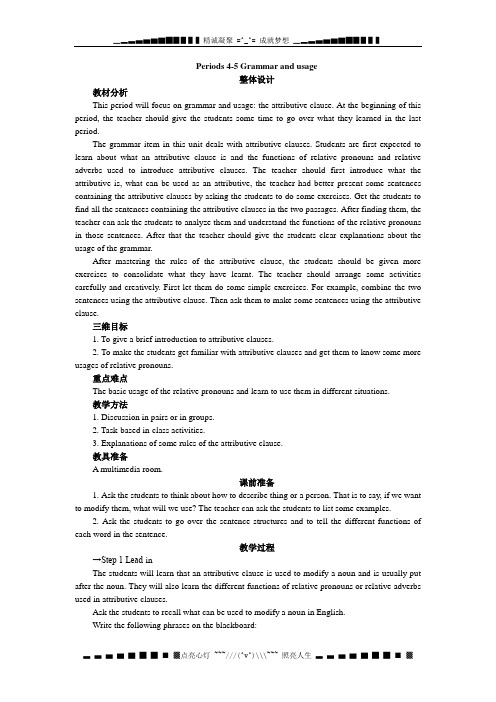
Periods 4-5 Grammar and usage整体设计教材分析This period will focus on grammar and usage: the attributive clause. At the beginning of this period, the teacher should give the students some time to go over what they learned in the last period.The grammar item in this unit deals with attributive clauses. Students are first expected to learn about what an attributive clause is and the functions of relative pronouns and relative adverbs used to introduce attributive clauses. The teacher should first introduce what the attributive is, what can be used as an attributive, the teacher had better present some sentences containing the attributive clauses by asking the students to do some exercises. Get the students to find all the sentences containing the attributive clauses in the two passages. After finding them, the teacher can ask the students to analyze them and understand the functions of the relative pronouns in those sentences. After that the teacher should give the students clear explanations about the usage of the grammar.After mastering the rules of the attributive clause, the students should be given more exercises to consolidate what they have learnt. The teacher should arrange some activities carefully and creatively. First let them do some simple exercises. For example, combine the two sentences using the attributive clause. Then ask them to make some sentences using the attributive clause.三维目标1. To give a brief introduction to attributive clauses.2. To make the students get familiar with attributive clauses and get them to know some more usages of relative pronouns.重点难点The basic usage of the relative pronouns and learn to use them in different situations.教学方法1. Discussion in pairs or in groups.2. Task-based in-class activities.3. Explanations of some rules of the attributive clause.教具准备A multimedia room.课前准备1. Ask the students to think about how to describe thing or a person. That is to say, if we want to modify them, what will we use? The teacher can ask the students to list some examples.2. Ask the students to go over the sentence structures and to tell the different functions of each word in the sentence.教学过程→Step 1 Lead-inThe students will learn that an attributive clause is used to modify a noun and is usually put after the noun. They will also learn the different functions of relative pronouns or relative adverbs used in attributive clauses.Ask the students to recall what can be used to modify a noun in English.Write the following phrases on the blackboard:a happy moment blue skybus stationthe article about your experience in the UKPoint out a noun, an adjective or the prepositional phrases can be used to modify a noun. Summarize the rule of the order in these examples.We put adjectives or nouns before nouns to modify them while we put prepositional phrases after nouns to modify them.An example on the blackboardAdjective: the green teamPrepositional phrase: the team in greenAttributive clause: the team who are wearing green.Point out that the last sentence is an attributive clause. That means a sentence is used to modify a noun. The nouns they modify are called antecedents.Write the following words on the blackboard.→Step 2 Introduction to attributive clausesGive some examples of attributive clauses on the blackboard.1. The girl who/that is standing next to our teacher is her daughter.2. The girl whom/who/that my mother is talking to is my classmate.3. The girl whose name is Rose sits next to me.4. I can’t find the book which/that is borrowed from you.5. I can’t find the book which/that you lent to me.6. I can’t find the book whose cover/the cover of which is red.Ask the students to find out antecedents, relative pronouns and functions of the relative pronoun and fill in the form below.Example Antecedent Attributive clause Function of the relativepronoun1 the girl who/that is standing next to our teacher subject2 the girl (whom/who/that)my mother is talking to object3 the girl whose name is Rose possessive4 the book which/that is borrowed from you subject5 the book (which/that) you lent to me object6 the book whose cover/the cover of which possessiveTell the students that the noun or the antecedent usually refers to a person/people or a thing/things, for example a story, a cake, books and so on. We use which/that as a relative pronoun to refer to things, while we use who/whom/that as a relative pronoun to refer to people. Which/that is used as the subject or object in the attributive clause. Who/that is used as the subject in the attributive clause and whom/who/that is used as the object in the attribute clause. And they will know when which, that, whom, who can be left out if it refers to an object in the attributive clause.→Step 3 PracticeShow the following sentences on the blackboard.1. I don’t know the man. The man wrote the article.2. The paintings are being displayed in the assembly hall. David donated the paintings to the school.3. She has a brother. I can’t remembe r his name.4. You made a cake yesterday. It was delicious.5. The river flows to the sea. The banks of the river are covered with trees.6. Do you know the girl? The headmaster is talking to her.Ask the student to combine the two sentences together using attributive clauses.Sample answers.1. I don’t know the man who/that wrote the article.2. The paintings (which/that) David donated to the school is being displayed in the assembly hall.3. She has a brother whose name I can’t remember.4. The cake (which/that) you made yesterday was delicious.5. The river whose banks/the banks of which are covered with trees flows to the sea.6. Do you know the girl (who/whom/that) the headmaster is talking to?Note 1:Sometimes the antecedent can be a pronoun, such as ‘someone somebody, everybody, no one, nobody, something, anything, everything, nothing, all, those’, etc.Here are some examples:1. Everyone who/that knows him thinks highly of him.2. Nobody that/who has been there will forget the beauty of the place.3. All that must be done has been done.4. I want to find someone who/that can speak Japanese.Note 2:If the antecedent is an infinitive pronoun, ‘all, few, little, much, something, nothing, anything’, etc. , the best relative pronoun is that.Examples:1. All that we have to do is to practice speaking English.2. Some parents are willing to do anything that their children ask them to.Note 3:If the antecedent is modified by ‘all, any, every, each, few, little, no, some’ etc. , the best relative pronoun is that.Examples:I’ve eaten all the food that was given to me.Note 4:If the antecedent is modified by ‘the only, the very, just’, it is better to use that as the relative pronoun.He is the very man that helped the girl out of the water.Note 5:I f the antecedent is modified by ‘the first, the second, the last or the best’ etc. , you’d betterThe first English book that I read was “The Prince and the Pauper” by Mark Twin.Note 6:If the antecedents refer to people and things, it is better to use ‘that’ as the relative pronoun.He talked about the teachers and schools that he had visited.Exercises:1. All_____________ is needed is a supply of oil. (that)2. Finally, the thief handed everything_____________ he had stolen to the police. (that)3. This is the most interesting film_____________ I have ever seen. (that)→Step 4 Consolidation1. Read the article from a UK school newspaper on page 9. Underline the attributive clauses the students can find in the article.2. Point out the relative pronoun in each sentence and the functions of them in the attributive clauses.→Step 5 Homework1. Do Part C1 on page 88.2. Preview the relative pronouns.3. Do some exercises about the attributive clause.板书设计精彩片断Practice: The students are asked to combine the two sentences into one. If they are divided into groups to compete, it will arouse their interest. They will be very interested in getting high grades in the competition for their groups.G1 G2 G3 G4。
英语牛津译林版 必修一Unit1《School life》教案period 6~7
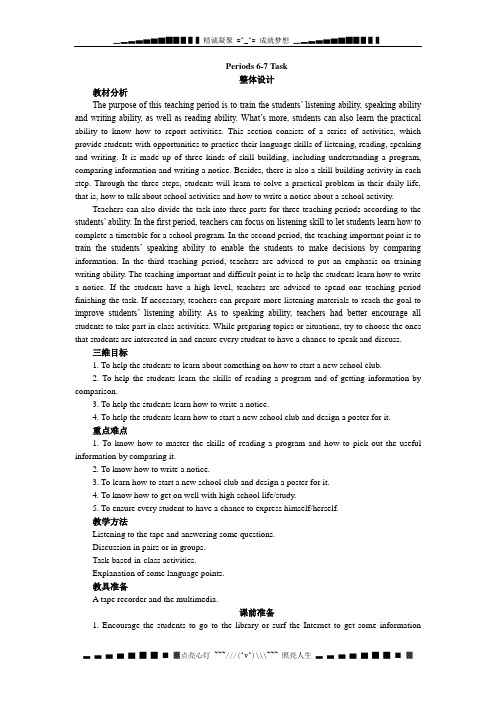
Periods 6-7 Task整体设计教材分析The purpose of this teaching period is to train the students’ listening ability, speaking ability and writing ability, as well as reading ability. What’s more, students can also learn the practical ability to know how to report activities. This section consists of a series of activities, which provide students with opportunities to practice their language skills of listening, reading, speaking and writing. It is made up of three kinds of skill building, including understanding a program, comparing information and writing a notice. Besides, there is also a skill building activity in each step. Through the three steps, students will learn to solve a practical problem in their daily life, that is, how to talk about school activities and how to write a notice about a school activity.Teachers can also divide the task into three parts for three teaching periods according to the students’ ability. In the first period, teachers can focus on listening skill to let students learn how to complete a timetable for a school program. In the second period, the teaching important point is to train the students’ speaking ability to enable the students to make decisions by comparing information. In the third teaching period, teachers are advised to put an emphasis on training writing ability. The teaching important and difficult point is to help the students learn how to write a notice. If the students have a high level, teachers are advised to spend one teaching period finishing the task. If necessary, teachers can prepare more listening materials to reach the goal to improve students’ listening ability. As to speaking ability, teachers had better encourage all students to take part in class-activities. While preparing topics or situations, try to choose the ones that students are interested in and ensure every student to have a chance to speak and discuss.三维目标1. To help the students to learn about something on how to start a new school club.2. To help the students learn the skills of reading a program and of getting information by comparison.3. To help the students learn how to write a notice.4. To help the students learn how to start a new school club and design a poster for it.重点难点1. To know how to master the skills of reading a program and how to pick out the useful information by comparing it.2. To know how to write a notice.3. To learn how to start a new school club and design a poster for it.4. To know how to get on well with high school life/study.5. To ensure every student to have a chance to express himself/herself.教学方法Listening to the tape and answering some questions.Discussion in pairs or in groups.Task-based in-class activities.Explanation of some language points.教具准备A tape recorder and the multimedia.课前准备1. Encourage the students to go to the library or surf the Internet to get some informationabout school activities in China and some foreign countries. If possible, the students can also be divided into several groups to get some information about high school activities in different countries as they like.2. Before class, ask the students to go over how to use a relative pronoun properly.教学过程→Step 1 GreetingWhile greeting, teachers can intend to use some expressions with attributive clauses. Teachers can also encourage the students to answer some everyday English with attributive clauses.→Step 2 RevisionCheck the homework and review the usage of relative pronouns. The important teaching aim of last teaching period is to know how to use a relative pronoun properly. Let the students recall the definition of a relative clause. A relative pronoun is a word used to replace a noun or a noun phrase and introduces a relative clause referring to the antecedent. The relative pronouns of English are: who, whom, whose, which, and that. After that, ask the students to finish the following exercises.Translate the following sentences into English:1. 站在那里的那个高个子是我的兄弟。
高中英语 Unit1(school life)welcome教案1 牛津译林版必修1 教案
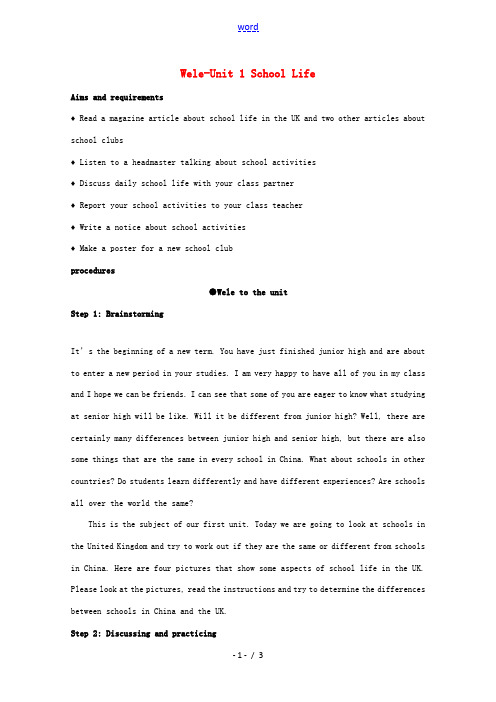
Wele-Unit 1 School LifeAims and requirements♦ Read a magazine article about school life in the UK and two other articles about school clubs♦ Listen to a headmaster talking about school activities♦ Discuss daily school life with your class partner♦ Report your school activities to your class teacher♦ Write a notice about school activities♦ Make a poster for a new school clubprocedures●Wele to the unitStep 1: BrainstormingIt’s the beginning of a new term. You have just finished junior high and ar e about to enter a new period in your studies. I am very happy to have all of you in my class and I hope we can be friends. I can see that some of you are eager to know what studying at senior high will be like. Will it be different from junior high? Well, there are certainly many differences between junior high and senior high, but there are also some things that are the same in every school in China. What about schools in other countries? Do students learn differently and have different experiences? Are schools all over the world the same?This is the subject of our first unit. Today we are going to look at schools in the United Kingdom and try to work out if they are the same or different from schools in China. Here are four pictures that show some aspects of school life in the UK. Please look at the pictures, read the instructions and try to determine the differences between schools in China and the UK.Step 2: Discussing and practicingLet’s have a discussion for several minutes.(The teacher can use the following contents to help students.)Now try to bine your own school experiences with knowledge gained from this text and other sources, so that you can participate fully in the discussion.(Give studentsa couple of minutes to talk about the following three questions.)1. Do you know any other differences between the lives of Chinese and British high school students?2. What kind of school activities do you enjoy?3. What is your dream school life like?Now in groups exchange your opinions and everyone is supposed to speak out your idea. Each group will then report your conclusions to the whole class.。
牛津译林版高中英语必修一Unit 1《School Life》(Reading 2 language points)教案
(2)占(时间,空间)The city covers ten square miles.
(3)包括,涉及His researches covered a wide field.
(4)走过,行(多少路程)cover twenty miles a day.
7.a bit of =a litt le一点(修饰不可数名词
Not a little很,十分not a bit=not at all一点也不
8.as well as“除……还有”“不但,而且”
The teacher as well as his students was fond of classic music.
Talking with foreigners is a good way to improve one’s English.
另外:动名词也可以作为表语和宾语。
e.g My job is teaching your English.
I can’t help expressing my good feeling about An Yi Middle school.
Module 1 Unit 1 School life Reading 2 language points
课题
M1U1 reading 2 language points
课型
New
教学目标
learn some useful words and expressions
attend, earn, respect, achieve, challenging, prepare, drop, miss, experience, introduce, for free, at lunchtime, word by word, on average, sound like
Unit1SchoolLife(译林牛津版高一英语必修一教案教学设计)
Unit1SchoolLife(译林牛津版高一英语必修一教案教学设计)Textual Analysis:This unit introduces and develops the theme of school life.(1) In Welcome to the unit, students are presented with four different aspects of school life in the UK and are asked to compare the differences between high schools in the UK and in China. The reading text School life in the UK deals with an article from a school magazine on school life in the UK.(2) Word power talks about school facilities;(3) In grammar and usage, students are required to learn the Attributive Clause--- the usages of “that, which, who, whose, whom”.(4) Task deals with reporting school activities. In the Project section, students will learn how to design a poster.Teaching aims:Encourage the Ss to learn the following(1) Vocabulary: words and phrases(2) Grammar: the Attributive Clause--- the usages of “that, which, who, whose, whom”(3) Skills of reading a magazine(4) Culture: school life; school activities; after-school activities; schoolclubsImportant points & difficult points:The Attributive Clause; Making a projectTeaching aids:computer; tape-recorderInteractive patterns:teacher-class; pairs; groupsTeaching methods:Audio-visual method; Direct method; Functional approach Teaching process:Welcome to the Unit: (0.5 period)(1) Warming up questions(2) Talk about the pictures(3) More questionsReading: (1.5 periods)(1) Lead-in(2) First reading(3) Further reading(4) Text Check(5) Notes/language points(6) ExercisesGrammar (task-teaching method) (2 periods)(1) explanation(2) exercisesWord power (1.5 periods)(1) text learning(2) more exercisesProject (1.5periods)(1) text learning(2) more practiceSelf-assessment (1 period)/Test (1 period)Periods:Welcome to the Unit: (0.5 period)(1) Warming up questionsa. What school were you at last term?b. Why did you choose our senior high school?c. Are there any differences?(2) Talk about the picturesa. Huge campus and low-rise buildingsb. Lockers for every studentc. Fewer students in each classd. At ease with our teacher(3) More questionsa. Do you know of any other differences between the lives of Chinese and British high school students?b. What kind of school activities do you enjoy?c. What is your dream school life like?预习专练I.请根据句意填写适当的单词1. Going to a foreign high school for some time is very ________(开心) and exciting.2. Almost no high school students are ___________ (满意)with the school hours in China.3. I know from my own ____________(经历) how difficult this kind of work can be.4. I felt lucky as all my teachers were very ___________ (有助)and I enjoyed all my subjects.5. Sometimes I played football with the boys. Sometimes I just ________ (放松)under a tree or sat on the grass.6. George Bush was invited to a__________ the APEC held in Shanghai.7. My English i_________ a lot as I used English every day and spent an hour each day reading English books in the library.8. The paintings that David d__________ to the school are being displayed in the assembly hall.9. Though it didn’t look l________ a table when it was finished, I still liked it very much.10. British people eat lots of desserts after their m_________ meal.Reading: (1.5 periods)(1)Lead-inHow long did Wei Hua stay in Britain?What was the name of Wei Hua’s class teacher?What did Wei Hua make in her Woodwork class?(2) First readingExercises: (P4)C1/C2(3) Further readingMake an interview.S1-S2(Wei Hua)Write an article about the differences between high schools in the UK and in China.(4) Text CheckGoing to ____ British high school for one year was ____ very enjoyable and exciting experience for me. I was very happy ______the school hours in Britain because school ______ around 9 a.m. and ends about 3.30p.m. This means I could get up an hour later ________ as schools in China begin before 8 a.m. On the first day, all students went to attend _______ assembly. I sat _______ a girl _______ name was Daniel.We soon became best ______. The best way ______ ____respect from the school was ______ hard and achieve high grades. This sounded ______ my school in China. I _____ many teachers in the past year and they each taught only one ________. Miss Burke was the teacher ______ taught us English literature. This is about the ________ size for British schools. We had to _______ different classrooms _____ different classes. I found the homework was not as _____ as ____I used to get in my oldschool, but it was a little ________ for me at first because all my homework was ____ English. I felt lucky as all my teachers were _________ and I enjoyed all my subjects. My English _______ a lot as I used English every day and spent an hour each day _____ English books in the library. I usually e-mailed my family and friends back home _____ at lunchtime. I also had an _____ French class ____ Tuesday evenings. Cooking was really ___ great fun as I learned how to buy, prepare and cook food. At the end of the term we ____ a class party and we all had to cook something.(5) Notes/language points重点词汇解析attend v. 参加原句在线:__________________________________________________________________ According to the law in China, all children between 6 and 14 must attend school. 根据中国法律,六到十四岁的儿童必须上学。
牛津译林版高中英语必修1教案Unit 1 School life1
Unit 1 School life(1)一. 教学内容:Unit 1 School life二. 教学目标:掌握阅读技巧skimming and scanning掌握Unit1词汇及词性变化三. 教学重难点:掌握课文中的重点句型的结构、用法Unit 1 School life(一)词汇woodwork n. 木工enjoyable adj. 愉快的,快乐的(二)课文重难点1)Going to a British high School for one year was a very enjoyable and exciting experience for me.动名词做主语,例:Playing basketball is an easy job while learning English is really hard work for me.Collecting stamps is my hobby. 我的嗜好是集邮。
2)Britain ----- England, Scotland, North Ireland, WelshBritish------English辨析Britain与England3)experience(1)n. 经验,u.n.He is a teacher full of experience.(2)n. 经历c.n.We would like to sit around Marco Polo and listen to his exciting experiences in China. Yao Ming’s experience in American will make him become a better player.姚明在美国的经历将使他成为更加优秀的球员。
(3)v. 体验to experience this different way of lifeto experience the beauty of nature体验自然之美联想1:experienced adj. an experienced teacher联想2:experiment n. 实验。
英语:unit1《school life》教案(译林牛津版必修1)
2. 3. 4. 5. 6. 7.
Skimming Scanning Detailed reading Thoughts after reading Group work (problem solving) Introducing moreinformation
英语:Unit1《School Life》教案(译林牛津版必修 1)
To introduceand develop the themeof schoollife To identify the differences between schoollife in different countries To develop the reading skills of skimming and scanning To learn somewords about schoolfacilities To learn about attributive clauses and how to userelative pronouns To develop listening, speaking, reading and writing by completing a task and aproject To form a positive attitude in a new and challenging situation To learn to be cooperative and helpful when working together
To know about schoollife in the UK
To compareschoollife in the UK and in China To form a positive attitude in a new and challenging situation
- 1、下载文档前请自行甄别文档内容的完整性,平台不提供额外的编辑、内容补充、找答案等附加服务。
- 2、"仅部分预览"的文档,不可在线预览部分如存在完整性等问题,可反馈申请退款(可完整预览的文档不适用该条件!)。
- 3、如文档侵犯您的权益,请联系客服反馈,我们会尽快为您处理(人工客服工作时间:9:00-18:30)。
I.单元教学目标
The First Period Reading
The Second Period Function and writing
The Third Period Listening and speaking
The Forth Period Language study
The Fifth Period Integrating skills
The Sixth Period Writing
Unit 1 School life I. 单元教学目标
II. 目标语言
Ⅲ. 教材分析与教材重组
1. 教材分析
本单元以School life为话题,旨在通过单元教学使学生了解英国校园生活的一些基本情况及中英两国校园生活的不同之处;学习并能运用表示校园设施的一些基本词汇;学习定语从句的基本概念及关系代词的用法;能就校园活动的话题展开讨论;能就校园活动情况向班任老师做出报告;学习通知的写法;学会设计以介绍学校俱乐部为主题的海报等。
1.1 Welcome to the unit 部分利用四幅图片,分别从(校园风貌、生活设施、课堂教学、师生关系)四个不同的侧面介绍了英国校园生活的有关情况。
该部分还设计了三个讨论话题,引导学生对中英两国校园生活进行比较,并就相关话题发表自己的看法。
1.2 Reading部分的短文节选自一份校园杂志。
文章由一位交换留学生所写。
作者通过自己的亲身经历简要地介绍了英国学校生活的一些情况。
文章前后分别设计了五个部分的练习:前两个练习(A、B)要求学生运用本单元介绍的两种基本阅读方法(skimming and scanning)阅读文章,把握文章主旨大意,了解文中明显的细节内容;练习C1通过问题的形式考查学生对文中具体信息的把握程度;C2通过判断正误练习加深学生对阅读材料的理解;D部分为词汇练习,要求学生首先联系上下文猜测所给词汇的含义;然后通过配对练习帮助学生掌握新词的含义和用法;E部分要求学生通过运用所给词汇填空的方式完成一封英国学生写给Wei Hua的信件,以进一步加深学生对阅读内容的理解;练习F设计了两个话题,引导学生对校园生活有关话题展开讨论,以获得对文章深层次的理解。
1.3 Word power部分以Wei Hua找食堂、回宿舍取课本、去健身房、找路等一系列活动为主线,设计了四个练习,学习有关表示学校设施的词汇并进行运用性训练。
Parts A 和B通过图示、阅读及写作的方式帮助学生熟悉相关词汇,复习问路、指路的相关表达;Part C通过一则CMHS的布告,对前两个练习中所学的词汇进行训练;Part D通过配对练习进一步拓展学生词汇。
1.4 Grammar and usage部分学习定语从句这一语法项目,课本重点对关系代。
